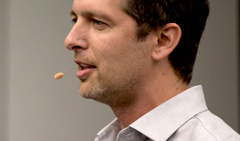What obstacles to memorization do you face? More importantly, what strategies have you found effective?

Page 3 of 4

What obstacles to memorization do you face? More importantly, what strategies have you found effective?

Is your ministry successful? If not, are you following these principles to help make it so?

There are many reasons seminary is valuable to a future preacher. But find out why it shouldn't define your ministry or its potential.

It's a new year. Will your church make an intentional plan to reach new people for Christ by establishing new small groups?

Does your church require new member classes? If so, what is the content of them, and are they useful?

Young pastors sometimes need a little push in the right direction for their ministry to take off. Here are some things that could help.

Pastor or church leader, have you considered continuing your education? Chuck Lawless, professor of evangelism and missions and dean of graduate studies at Southeastern Seminary, gives many good reasons why you should.

The movie Patch Adams is an inspiring, feel-good film starring Robin Williams. The real Patch Adams, however, is someone whose Christ-like character most people should aspire to emulate.
 My mentor, John Maxwell, has written and spoken about being mentored by the great coach John Wooden among others. I recently received a question by email asking, “How does one go about getting the greatest NCAA coach (John Wooden) as a mentor?
My mentor, John Maxwell, has written and spoken about being mentored by the great coach John Wooden among others. I recently received a question by email asking, “How does one go about getting the greatest NCAA coach (John Wooden) as a mentor?
"Did he (Maxwell) just ask for regular meetings and what does mentorship look like?”
Good questions.
I will admit that getting John Wooden as a coach is an extraordinary circumstance involving an extraordinary leader. But on the other hand, John Maxwell didn’t start there.
It was only after nearly 30 years of successful leadership that John was able to connect with Coach Wooden. It was John’s desire to grow and his great passion to add value to people’s lives that made the difference. The fact that John is a tremendous student is also a very significant part of the story.
Over the years I’ve wondered which is more important—to have a great mentor or to be a great student? The easy answer is both. But more and more, I think the secret is in being a great student. You can have the most brilliant mentor in the world, even a famous one, but if you aren’t ready to pay the price, dig in, learn and change, it won’t matter.
I love John’s early stories about offering to pay $100 for an hour of someone’s time just to ask questions and learn. Back then, $100 might as well have been $1,000! But that didn’t matter to John. That showed how serious he was, and at age 65, John is still passionate about learning and growing. I think that’s one of the reasons his books and talks are so good. They come not only from (now) 40 years of experience, but also from a fresh place of learning and relevancy.
In contrast, I’ve seen men and women receive an hour or so of someone’s time and show up ill-prepared. They had no written questions. They talked more than listened and expressed very little gratitude. It was almost as if they had some time to kill and thought that might be fun. When you do that to a busy person, they will not give you a second meeting.
So, do you want a mentor? Let me offer some good advice.
1. Be good at something first. This might sound strange, but you need to be good at something before you ask someone to help you be great at something. You can be good at anything! That doesn’t matter. You may want to be a great leader and your only claim to fame is that you are really good at golf or giving a talk. Maybe you are brilliant at math or a technological genius type. Here’s the point: If you are good at something, you have shown the passion and discipline to create the needed potential to become great at what you really want. I don’t want to discourage you, but if you’ve just been hanging out and you’ve never worked hard at anything, you’re not ready for a mentor. Perhaps you’re a young adult and your only claim to fame is that you were an A student in college. Great! That’s what I’m talking about. Get good at something first.
2. Seek someone just a little ahead of you. A common mistake is to think, “If I’m going for a mentor, I’m going right to the top and getting the best.” I appreciate the sentiment, but you are likely making a mistake. For example, if a pastor who serves in a church of 500 seeks a mentor who pastors a church of 5,000, the two of them clearly live in two different worlds and they barely speak the same language. Yes, leadership principles are leadership principles. That’s true, but trust me on this, and this is the key: You are much better off being mentored by someone who understands where you are because they were there at one time, and maybe even not so long ago! If you lead a church of 500, try to get a mentor who leads a church of 800 to 1,200. This is not a legalistic thing. Don’t get hung up on the numbers; just go with the idea. And of course, make the ask.
3. Think intentionally organic. Don’t ask for lots of regularly scheduled meetings. You will likely lose a potential mentor that way. Don’t ask for monthly or even quarterly connects. Go for a more intentionally organic approach. Here’s what I mean. If you can hang with a couple meetings (phone or in person) a year plus a few short emails, you might be surprised by how quickly you get a yes. Intentional refers to staying strategic and on purpose, and the organic simply means to catch the meetings when it works out naturally in both your schedules.
You don’t need lots of meetings, not if you really want to change and grow. Information requires lots of meetings—transformation requires only a few. If you connect with a good mentor two or three times in a year, that is plenty. It will take you at least that much time between conversations to really put to practice what was given to you. Now let’s do the math. If you have two or three mentors, you can see that would be six to nine meetings a year—basically way too much.
Note No. 1: When it’s a boss/employee relationship, of course you meet much more often, but much of that is just “doing business.” That’s natural and normal. It is unrealistic to think that’s all mentoring. In fact, if it is, you are likely into something closer to a counseling relationship than coaching and mentoring.
Note No. 2: When it’s a crisis situation, everything changes. If it’s a true crisis, your mentor will get that and quickly respond, and that requires more time. Sometimes in those situations I encourage the one I’m coaching to hire a consultant who can devote the needed time, and I remain as chief encourager during that crisis time.
4. Work harder than your mentor. Don’t waste your mentor’s time. Show up with well-thought-through and relevant questions. Take notes. Work hard to practice what was discussed, and the next time you talk, tell him or her what you have done.
A good mentor will always have some questions, a resource or two, and good advice, but the mentoring is more your job than his/hers. You set the agenda and come with it in writing. If your mentor asks you to do something, make the necessary adjustments, but do it. This does not prevent healthy disagreements and intense conversations, but you either want their advice or you don’t. If you don’t, that’s OK, but then stop taking their time, and end the mentoring relationship with respect and gratitude.
I’ve been blessed with five mentors over the course of my life, and I’m grateful! I’m sure that’s part of the reason I’m eager to coach as many as I can. I trust that you will also pass on what is given to you.
Dan Reiland is executive pastor of 12Stone Church in Lawrenceville, Ga., listed in Outreach magazine as the No. 1 fastest-growing church in America in 2010. He has worked closely with John Maxwell for 20 years, first as executive pastor at Skyline Wesleyan Church in San Diego, then as vice president of leadership and church development at INJOY. His semi-monthly e-newsletter, The Pastor’s Coach, is distributed to more than 40,000 subscribers. Dan is the author of Amplified Leadership, released in January 2012.
 Teaching people about Jesus through the Scriptures is one of my favorite things to do. But over the years, I’ve discovered bad habits that I had to overcome.
Teaching people about Jesus through the Scriptures is one of my favorite things to do. But over the years, I’ve discovered bad habits that I had to overcome.
If you teach at all, I’d guess that you struggle with things like this too. So I thought it might be helpful to list a few things we tend to do that I believe to be outside of our “job description” as teachers.
As a teacher your job is not to …
 I was recently watching a History Channel special on the days of 9/11. They highlighted many of the issues and misconceptions they feel contributed to the disaster.
I was recently watching a History Channel special on the days of 9/11. They highlighted many of the issues and misconceptions they feel contributed to the disaster.
I think the church could learn some valuable lessons from those.
1. It can happen to us. The U.S. had gotten to the point where it felt it were protected “by the great bodies of water” that bordered its country. So it never seriously considered a group could infiltrate to that level.
 My alarm rang at 3:30 a.m. I’m not a morning person. My wife, Deborah, is.
My alarm rang at 3:30 a.m. I’m not a morning person. My wife, Deborah, is.
Most mornings I stagger around like a cranky zombie. She bounces out of bed ready to attack a new day. Opposites attract.
We are on the 6:25 a.m. Manila to Tokyo to Detroit to Nashville. I’m thinking about starting a global campaign to ban all pre-noon international flights. Believe it or not, we encountered bumper-to-bumper traffic at 4:30 a.m. on the way to the airport—only in Manila. I am also campaigning for an early morning traffic ban.
Since I can’t sleep on planes, no matter how sleep deprived I may be, I turned on my iPad Bible and started reading 1 Corinthians 3:10-12:
 It has been well documented that today’s culture craves authenticity in leadership. It shouldn’t be, but many times it is hard to find in leadership, even in the church. One of the fastest ways for a leader to lose loyal followers is to fall short in the area of authenticity.
It has been well documented that today’s culture craves authenticity in leadership. It shouldn’t be, but many times it is hard to find in leadership, even in the church. One of the fastest ways for a leader to lose loyal followers is to fall short in the area of authenticity.
I was talking with a young staff member of another church recently. She said the reason she struggles to follow her pastor is the pastor isn’t off stage who he claims to be on stage. I get that. I think all of us struggle with that one … both in living authentic lives and in following an inauthentic leader.
How do we remain authentic as leaders? Here are 7 thoughts on remaining an authentic leader:
 I’ve worked for bullies that demanded trust. I’ve worked for weaklings that demanded trust. I’ve worked for very few that legitimately worked to build my trust in them.
I’ve worked for bullies that demanded trust. I’ve worked for weaklings that demanded trust. I’ve worked for very few that legitimately worked to build my trust in them.
Trust, like loyalty, is a two-way street that instead often looks like people driving three cars down the wrong lane, headed in the entirely wrong direction. As a leader, one has to think of trust as something built, not won in the lottery. It’s done in so many different ways.
1. Show people that you care about them. People don’t care how much you know until they know how much you care. Is that saying cliche? Yes. Is that saying correct? Yes.
 Just because I’m a pastor, that doesn’t mean I don’t continually learn things about God. It’s a daily process for everyone. Here are some things that I have learned or am learning about our Heavenly Father:
Just because I’m a pastor, that doesn’t mean I don’t continually learn things about God. It’s a daily process for everyone. Here are some things that I have learned or am learning about our Heavenly Father:
Sometimes God opens doors simply to show me that He can. I’ve seen it many times. God seemed to provide an opportunity, only to later make it clear that’s not the right one for this time. It’s always though an encouragement than when He is ready He can and will make a way.
God’s plan for my life is always bigger than mine. Every. Single. Time. I have underestimated Him all my life. You’d think I’d learn.
 I’ve been working for churches for 15 years, but, as many of you know, I’m only 12 months into this journey to focus full-time on church consulting and leadership coaching.
I’ve been working for churches for 15 years, but, as many of you know, I’m only 12 months into this journey to focus full-time on church consulting and leadership coaching.
I’m helping churches (and businesses now) get unstuck. It’s been an amazing journey.
Though I’m engaging leadership and strategic planning solutions that I’ve used for years, I’m also very much in the middle of launching a startup business.
Because I’m wired up to be entrepreneurial, I absolutely love it! But, at the same time, I’m also very aware of my responsibility to be the provider for my family. There is definitely risk involved. I’m reminded of it every time my family sits down at the dining room table to eat.

Note: This story was retrieved from Ministry Today's archives and was published in Ministry Today Magazine in 2004.
Meet three pastors who left their churches to hit the books.
They are among a growing number of Pentecostals and charismatics pursuing higher education ... and a higher calling.
At 53, Bob Proy hit the books ... again. A former pastor with more than 20 years of ministry experience, Proy has spent the last several years in classrooms, furthering his education.
He recently earned masters' degrees in communication, and marriage and family counseling from Oral Roberts University (ORU). Now, he is devoting his doctoral studies at ORU to establishing an after-care program for inmates and their families.
Proy envisions establishing rehabilitation centers outside urban areas where ex-convicts and their families can be discipled while adjusting to post-prison life. And he says higher education is the spark that lit his vision for the future.
 How churches are replacing traditional institutions for leadership training.
How churches are replacing traditional institutions for leadership training.
Page 3 of 4